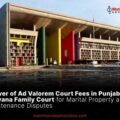
The Calcutta High Court, in a recent adjudication, underscored the welfare nature of maintenance provisions delineated in Section 125 of the Code of Criminal Procedure (CrPC). The Court elucidated that the stringent standard of proof, akin to that demanded in criminal law contexts, is not exigible in matters pertaining to maintenance claims. This legal stance was articulated by a singular adjudicator, Justice Ajoy Kumar Mukherjee, who, in the course of adjudicating a petition for the annulment of a maintenance claim, steadfastly maintained:
Conduct of wife/opposite party during her stay at her matrimonial house may not be the sole parameter to be considered before granting maintenance under 125 Cr.P.C. Said provision being a welfare legislation is not supposed to be construed what is likely to be construed to prove a case beyond reasonable doubt under section 498A I.P.C. or Under Section 406 of the IPC. I find that this is not a fit case where invoking jurisdiction under section 482 of the Code of Criminal procedure the present proceeding, can be quashed on the basis of the judgment passed in favour of the petitioner wherein criminal proceeding under section 498A/406/34 was quashed.
The petitioner has invoked the jurisdiction of the Court under Section 482 of the Code of Criminal Procedure (CrPC) to seek the quashing of all proceedings initiated pursuant to Section 125 of the CrPC. This plea relies on a precedent set by a coordinate bench, wherein the petitioner was exonerated from charges under IPC Sections 498A, 406, and 34.
The crux of the argument posited is that the matrimonial union between the petitioner and the opposing party transpired in 2016, with the latter spending a mere seven days in the matrimonial domicile. Subsequently, the petitioner initiated legal proceedings seeking a declaration of nullity for the said marriage.
It was advanced that in response, the wife initiated harassment against the petitioner and his family, instituting cases under the aforementioned sections of the Indian Penal Code (IPC) and a concurrent maintenance case under Section 125 of the Code of Criminal Procedure (CrPC).
The submission contended that the allegations in both the criminal and maintenance cases were congruent. The criminal cases, having been quashed by the Court due to their vague and unsubstantiated nature, established the absence of evidence supporting the purported offenses by the petitioner.
The petitioner contended that the aforementioned judicial pronouncement exemplified the wife’s propensity to fabricate false assertions, even within her maintenance plea and sworn affidavit, wherein she omitted details pertaining to her education, employment, and living standards. Consequently, the petitioner asserted the lack of merit in the maintenance application, urging its quashing.
Counsel for the wife countered that the petitioner’s failure to submit his affidavit of assets and liabilities in the maintenance case, coupled with the inadequacy of the grounds articulated in his application for quashing, undermined the petitioner’s position.
Further, it was argued that the wife’s entitlement to maintenance should not be prejudiced by her educational background and familial affluence. The assertion posited that the determination of maintenance should await trial, given the triable issues raised by the wife. Consequently, the unemployed petitioner’s application for maintenance could not be summarily quashed.
In its deliberation, the Court acknowledged the petitioner’s contentions, underscoring the prior quashing of the Section 498A case and asserting the wife’s self-sustaining capacity.
Crucially, the Court delineated the disparate objectives of Section 498A IPC, primarily directed at addressing cruelty culminating in dowry-related fatalities, from Section 125 CrPC, characterized as welfare legislation facilitating maintenance for spouses encountering spousal refusal or neglect. The Court pronounced:
Refusal or neglect can be express or implied and it can be by words or by conduct. There can be different shades of neglect or refusal and without trial it is hardly possible to conclude as to whether there was any refusal or neglect or not at this budding stage of the proceeding.
Consequently, the court determined that the issue of the wife’s entitlement to maintenance could only be ascertained through a trial. The financial status of the wife’s family and her educational qualifications were deemed irrelevant to the continuance of the maintenance suit.
As a result, the plea was rejected.





